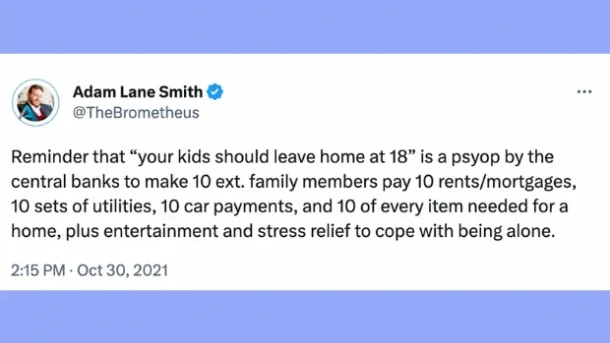Moving out of parents house at 18, is it an American dream or just a manipulative ploy by banks to make people pay more rent? Let’s find out!
For many young adults, moving out at 18, has long been associated with the transition into adulthood. In Western societies, this milestone is often accompanied by the societal expectation to move out of one’s parents’ home and become fully independent.
However, an emerging perspective challenges this notion, suggesting that the pressure to leave home at 18 is a psychological operation perpetuated by central banks to encourage increased rent payments.
Related: Fear of Never Moving Out: 5 Ways Parents Can Help Young Adults’ Career Success
Moving Out Of Parents House At 18, Psychological Operation By Central Banks, According To Adam Smith
This alternative viewpoint sheds light on the financial burdens and societal norms that often overshadow the benefits of staying at home.
Attachment Specialist, Adam Lane Smith recently sparked a conversation about the cultural expectations surrounding young adults leaving home at 18.
Smith suggests that this notion is driven by a desire to make young people to pay rent and bills, ultimately benefiting central banks. Indeed, moving out at 18 does not automatically equate to adulthood, as it merely introduces new financial responsibilities.
Many individuals who continue living with their parents after turning 18 do so for valid reasons such as financial support or cultural norms.

Smith’s argument resonates with numerous individuals who see staying at home as a way to save money and alleviate the financial strain imposed by skyrocketing rent prices.
Testimonies on social media platforms support this perspective, with individuals sharing how moving back home has allowed them to save significant amounts of money.
The Western emphasis on leaving home at 18 contrasts with the cultural norms in many European countries. Pew Research Center’s findings reveal that in 24 out of 29 European countries surveyed, more than one in three adults between 18 and 34 still live with their parents.
This statistic challenges the notion that leaving home at 18 is a universal marker of adulthood. In these societies, it is accepted that young adults may continue living with their families for an extended period, allowing them to establish themselves financially before venturing into independent living.
The social pressure of moving out of home at 18 stems from a deeply ingrained notion of the “American Dream” that associates success with individual financial achievements.
However, with the average American debt reaching staggering amounts and a significant percentage of households burdened by various debts, leaving home may not be a viable option for many young adults.
The current economic climate, compounded by the recent pandemic and inflation, challenges the feasibility of this traditional idea of success.

It is essential to question the Westernized concept of adulthood, which places an undue emphasis on financial independence and homeownership. The definition of success and adulthood should not be solely measured by the speed at which one can leave their childhood home.
By recognizing the benefits of staying at home, such as financial stability and the ability to support aging parents, we can reshape societal expectations and redefine what it means to be an adult.
The pressure to leave home at 18 is a cultural phenomenon rooted in Western society’s obsession with independence and individual success. However, the financial realities and cultural differences across the globe challenge this idea.
The ongoing conversation initiated by Adam Lane Smith invites us to reconsider the societal expectations imposed on young adults. By re-evaluating the importance of financial independence as the primary marker of adulthood.
We can create a more inclusive and realistic definition of success, one that values familial bonds, financial stability, and personal.
Related: Adulthood Can Be Tough, But You Are Tougher
These were some of the things to know when moving out of home. What are your thoughts about this? Share in the comments below!





Leave a Reply
You must be logged in to post a comment.